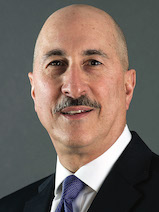
Ralph Petta,
President & CEO,
ELFA
The lack of diversity, equality and inclusion is a pressing issue in every industry, business, government and sector of society. To identify and combat the issue, it is important to fully comprehend what diversity, equality and inclusion mean. Diversity is the range of human differences, such as race/ethnicity, gender, age, sexual orientation, family structure, education, religion and mental/physical ability. Inclusion means fostering a sense of belonging where individuals feel respected, heard and supported regardless of cultural differences. Equality can be thought of as giving everyone the same chance to succeed and make the most of their careers and lives.
The terms are relatively simple, but the equipment finance industry and most other markets have come up short in welcoming all ideas to the table and ensuring equal representation and inclusion for women, people of color and other minority groups while creating conversation around these pressing issues. Having a diverse, equal and inclusive industry environment is imperative to a fair and functioning market, and individuals look to corporate leaders to take responsibility within their organizations to confront and balance these inequities.
The Equipment Leasing and Finance Association is prioritizing diversity, equality and inclusion as part of its mission as it embarks on its second year of hosting an Equality Committee and the fourth year of its Women’s Council. In 2016, Ralph Petta, president and CEO, and the board of directors took action to affirm the association’s commitment to advancing diversity, equality and inclusion. The association added new language to its mission statement and also formed the Emerging Talent Advisory Council, which encourages new and up-and-coming employees from ELFA member companies to become involved in the association early in their careers.
Forming the Women’s Council
In 2016, the first ELFA’s women’s group was formed. The Women in Leasing Working Group analyzed survey data from female ELFA members to increase women’s inclusion in the association. A year later, the ELFA Women’s Council officially formed out of this group, founded by chairwoman Lori Frasier. The council established objectives to provide access, inclusiveness and gender-balanced leadership across the ELFA, its member companies and the equipment finance industry as a whole.

Members got to work quickly, launching the ELFA Women’s Leadership Forum, an annual event focused on leadership development for women at all stages of their equipment finance careers. Breakout sessions on gender-balanced leadership were hosted for the first time at the ELFA Annual Convention, and the association expanded full participation in Women’s Council networking events. Conversation in the council’s Women4Inclusion LinkedIn group started off very actively, bringing those excited about the movement together in support of gender-balanced leadership and inclusion. Rhonda SanFilipo was instrumental in social media engagement and advocacy for the group, which would later pave the way for ELFA Equality.
“In 2018, ELFA Women’s Council established its ‘20 by 2020’ goal, targeting to reach 20% female attendance at the ELFA Convention by 2020,” Deborah Baker, chairwoman of the ELFA Women’s Council, says. “In 2019, we reached 18% attendance. The traditional convention was cancelled this year due to COVID and replaced with a virtual event, ELFA 2020 Business LIVE! This event had 28% female attendees. Although it is not a direct comparison, we are excited to see such a strong representation.”
Currently, under Baker’s leadership, the Women’s Council is preparing for 2021 with a number of new initiatives, including a mentoring program for women executives and a new, fully accessible online library of women’s leadership resources.
And that’s essentially how a movement begins: a common idea diffuses between groups of people to form into something larger. After witnessing the successful efforts around women’s inclusion in the association, ELFA’s board of directors sought to expand its diversity, equality and inclusion initiatives further to encompass more than just women. Petta formed a subcommittee to explore the idea, and after a few evolving PowerPoints, meetings and conversations, ELFA Equality was born.
ELFA Equality
Petta notes that the ELFA Equality initiative fits with the organization’s long-standing mission. “ELFA’s diversity, equality and inclusion initiatives provide a perfect example of our association’s essential role in bringing together individuals to benefit the industry as a whole,” he says. “We are fortunate to have engaged member volunteers and a strong leadership team who identify and advance critical priorities designed to strengthen our industry and help our member companies succeed. From D&I to other important issues — legislative, technological, economic and business — the ELFA community will continue to do what is necessary to support our great industry.”

When forming ELFA Equality, founder Scott Thacker and those involved in preliminary meetings established a few essential foundational items, including a three-year strategy plan outlined with goals and objectives, a mission statement, and a steering committee with a target demographic of 60% of its members from underrepresented groups and 40% considered allies and supporters. Petta and the ELFA board gave Thacker the green light for the official formation of the committee, and Thacker began to network with various industry members to garner interest for membership in ELFA Equality’s steering committee.
“Somebody happened to mention the initial subcommittee to me, and I felt, well, I’ve been on the board, I’m the chairman of the foundation board of trustees and I’m gay, so I understand diversity and the ELFA. And I’m probably one of the more senior people in the industry who is diverse and who is happy and open about being diverse, so let’s make it happen,” Thacker says.
The original projection for the number of committee members was about a dozen to 13 with the aforementioned 60/40 split.
Thacker explains, “From my past experiences in diversity initiatives, you have to have allies who are supportive of you. A diversity council of all people who identify as diverse doesn’t work because you need the support of people who are not diverse — it’s all about working together.”
Met with excitement, ELFA Equality quickly gained momentum, with 18 members on the initial steering committee. With those individuals interested, the demographic ended up being 70% members from underrepresented group and 30% allies. After Jud Snyder officially announced the formation of the group at the 2019 ELFA annual convention, Thacker recalls receiving high-fives and pats on the back from those he didn’t know, thanking him and expressing their long-time desire for something akin to ELFA Equality.
Similar to the Women’s Council, the ELFA Equality LinkedIn group helped to establish the movement’s presence and bring passionate associates together. SanFilipo again took the lead on social media initiatives, moderating group discussions while offering lessons learned from the Women’s Council. Deborah Reuben, who was hired to devise annual strategic planning exercises for the Women’s Council, joined the steering committee at the 2019 convention to facilitate a session focusing on establishing what ELFA Equality is, where it was going and what it intends to accomplish. Various subcommittees formed and a three-year strategic, thematic approach was established: year one would surround awareness, year two would focus on action and year three would be dedicated to breaking past mainstream patterns. The committee also decided that ELFA Equality would be discussed during each one of the ELFA’s conferences and conventions.
Raising Awareness
Currently in year two of that strategic plan, ELFA Equality has taken several social actions in the wake of recent spiking awareness surrounding racial issues. In 2020, the association published a statement pledging to use its movement to fight racial injustice and intolerance in wake of the death of George Floyd. To encourage further dialogue and conversation, the ELFA also included educational webinars on diversity and inclusion topics as part of its Wednesday Webinars series, including “Bold Conversations to Effect Positive Change: Striving for Equality” and “An Introduction to Unconscious Bias.”
While creating internal change in an organization is the first step toward embracing diversity, equality and inclusion, influencing other businesses is a high priority within the movement as well. To assist other companies in their mission to create a more equal and inclusive culture, the ELFA created the Diversity & Inclusion Toolkit. The kit arms member companies with usable, educational resources to aid them in their journey in embracing diversity and inclusion. The resource highlights business cases for diversity and inclusion (for example, companies in the top quartile for racial and ethnic diversity are 35% more likely to have financial returns above their respective national industry medians), outlines key definitions to know (unconscious bias, stereotyping, bandwagon effect and more) and provides links to resources and articles that help drive diversity and inclusion in the workplace.
When it comes to a leading philosophy, ELFA Equality aims to achieve an “evolutionary” versus “revolutionary” change to create an environment of equality, diversity and inclusion in everything it does — specifically utilizing the word evolutionary because, according to Thacker, this movement will gradually happen and build over time as people understand and commit to its mission. ELFA’s objective is to convey the right messages and act organically, evolutionarily and effectively. An example of this action includes ensuring that those in charge of nominating committees for business councils and executive boards obtain a diverse balance of individuals.
The first ELFA Equality Summit was planned to take place in person in 2021 to discuss the best strategies and approaches in fostering diversity and inclusion in businesses. The summit will most likely not occur (at least physically) due to the pandemic. But while the world experienced an unexpected health crisis in 2020, it also experienced a rise in awareness surrounding race-related issues, which provided ELFA Equality with the opportunity to prove its support and vocally address the Black Lives Matter movement and racism issues.
“So far, given the two webcasts we’ve done and the ELFA Equality session at ELFA 2020 Business Live!, we’re achieving our mission of awareness and thought provocation [and] getting people to think about what this means and how it can be infused in their organizations going forward,” Thacker says.
The ultimate vision for the committee is infectious engagement. Retaining its robust steering committee, encouraging and supporting companies currently hosting diversity, equality and inclusion activities, and helping members whose companies do not have a DE&I focus are the association’s main objectives. The Diversity & Inclusion Toolkit is a great starting point for companies that do not currently host dedicated D&I activity to learn more about how to support the movement. The ELFA has made major movement and progression in its diversity and inclusion efforts, but like anything else, everybody must begin somewhere — and the most important part is taking that first step.
Ellie Delaney is a freelance editor based in Philadelphia. Rita E. Garwood, editor in chief of Monitor, interviewed Scott Thacker for this article.